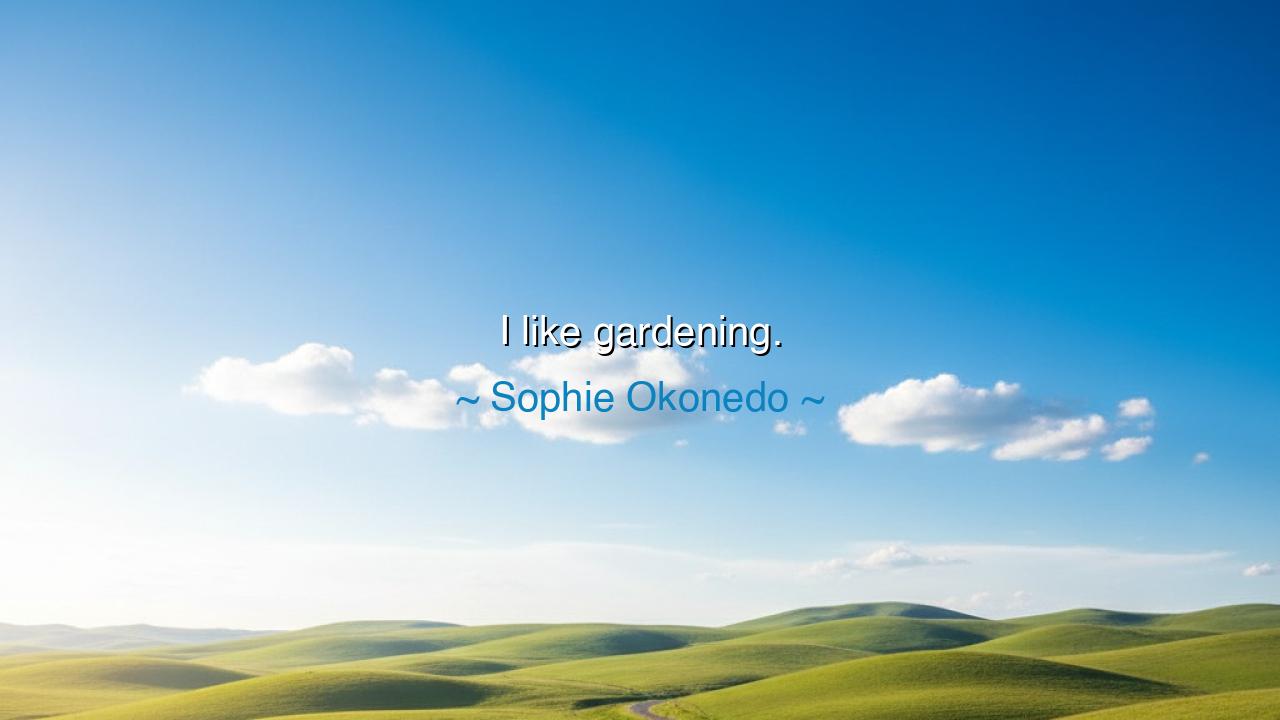
I like gardening.






“I like gardening.” — three simple words spoken by Sophie Okonedo, yet within their quiet simplicity lies a world of meaning. They may sound humble, even unremarkable at first, but like a seed buried in the dark earth, they contain an entire philosophy of life — one rooted in patience, creation, and peace. In saying this, Okonedo, the acclaimed actress known for her depth of feeling and thoughtful grace, reveals not only a pastime but a way of being. For to garden is to participate in the oldest partnership known to humankind — the sacred dialogue between the earth and the soul.
The origin of this quote, though casual in its phrasing, reflects the quiet rhythm that has long balanced the intensity of Okonedo’s life in the performing arts. As an actress who has lived amid bright lights, deep emotions, and the constant transformation of roles, she finds in gardening a return to truth — to soil, to stillness, to something that does not demand applause. In that gentle admission, “I like gardening,” we hear the voice of one who understands that creation does not always need to shout; sometimes it grows in silence. Her words remind us that gardening is not an escape from life, but a reconnection to its most essential pulse.
From the beginning of time, the garden has been both the cradle and the mirror of human existence. The ancients told of Eden, where the divine and the mortal walked together among living things. In every culture, from the hanging gardens of Babylon to the Zen temples of Japan, people have built gardens as reflections of the inner world. To tend a garden is to shape beauty from chaos, to nurture what cannot be hurried, and to learn again the lost language of patience. Thus, when Okonedo speaks of her love for gardening, she joins a lineage of poets, philosophers, and seekers who have found in the act of cultivation a metaphor for the soul’s own growth.
Consider the life of George Washington Carver, born into slavery yet destined to become one of the greatest agricultural minds of his age. He saw in every plant a lesson from the Creator. “When you can make two blades of grass grow where only one grew before,” he said, “you have served God.” For him, the soil was not lowly — it was sacred. Through years of quiet labor, he restored barren lands and healed both earth and man. In this way, he, too, might have said, “I like gardening” — but his liking was the devotion of a saint, the reverence of one who understood that the act of nurturing life is the truest form of prayer.
Gardening, as Okonedo and Carver both show in spirit, is not merely an art of the hands; it is a discipline of the heart. It teaches humility, for one cannot rush a seed. It teaches faith, for one must plant without seeing the end. And it teaches gratitude, for the simplest flower can remind us that beauty is born from the humblest dust. In a world that demands constant achievement, the garden offers a different kind of success — the quiet triumph of life sustained. To garden is to join in the rhythm of creation itself — to dig, to water, to wait, and finally to rejoice in the miracle that arises from care.
Even those who do not possess land may find the spirit of the garden in their daily lives. To cultivate is to care — whether it be for a plant, a friendship, or a dream. When you speak kindly to another, you plant a seed of peace. When you practice patience, you water the soil of your own spirit. When you forgive, you pull the weeds that choke the heart. Thus, gardening is not only the tending of plants, but the tending of the soul. Sophie Okonedo’s quiet confession, “I like gardening,” becomes, in this light, a universal truth — for we are all gardeners, each responsible for the growth of what we love.
So, my child, learn from this simplicity. Do not seek fulfillment only in grand achievements or the noise of the world. Return often to your garden — whether it be of soil or spirit. Plant something small, nurture it, and let time and care reveal its beauty. Do not fear the slow pace of growth; for what grows slowly grows deeply. When you feel weary, let your hands touch the earth, and remember that all creation began in dust — yet from that dust came life, and from life, love.
And thus, in her humble phrase, Sophie Okonedo speaks an ancient wisdom anew. “I like gardening” — meaning, I like peace. I like life. I like watching the invisible become visible, the possible become real. And perhaps that is the greatest secret of all: that in liking gardening, we learn to like life itself — fragile, unpredictable, yet ever beautiful in its becoming.






AAdministratorAdministrator
Welcome, honored guests. Please leave a comment, we will respond soon